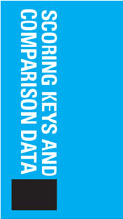Whetten David A., Cameron Kim S. Developing management skills
Подождите немного. Документ загружается.


BUILDING RELATIONSHIPS BY COMMUNICATING SUPPORTIVELY CHAPTER 4 277
2. a. Reflecting response
b. Deflecting response
c. Advising response
d. Reflecting response
e. Probing response
3. a. Probing response
b. Deflecting response
c. Advising response
d. Reflecting response
e. Probing response
4. a. Reflecting response
b. Probing response
c. Deflecting response
d. Deflecting response
e. Advising response
Part II
1. a. Problem-oriented statement
b. Person-oriented statement
2. a. Incongruent–minimizing statement
b. Congruent statement
3. a. Descriptive statement
b. Evaluative statement
4. a. Invalidating statement
b. Validating statement
5. a. Owned statement
b. Disowned statement

278 CHAPTER 4 BUILDING RELATIONSHIPS BY COMMUNICATING SUPPORTIVELY
SKILL PRACTICE
Diagnosing Problems and Fostering Understanding:
United Chemical Company and Byron vs.Thomas
Observer’s Feedback Form
As the observer, rate the extent to which each of the role players displayed the following
behaviors effectively. Use the following numerical rating scale for each person. Identify
specific things that each person can do to improve his or her performance.
1 = Strongly disagree
2 = Disagree
3 = Neither
4 = Agree
5 = Strongly agree
COMMUNICATION ATTRIBUTE ROLE 1ROLE 2ROLE 3
1. Communicated congruently. ______ ______ ______
2. Used descriptive communication. ______ ______ ______
3. Used problem-oriented communication. ______ ______ ______
4. Used validating communication. ______ ______ ______
5. Used specific and qualified communication. ______ ______ ______
6. Used conjunctive communication. ______ ______ ______
COMMUNICATION ATTRIBUTE ROLE 1ROLE 2ROLE 3
7. Owned statements and used personal words. ______ ______ ______
8. Listened inventively. ______ ______ ______
9. Used a variety of response alternatives
appropriately. ______ ______ ______
Comments:

279
Gaining
Power and
Influence
SKILL
DEVELOPMENT
OBJECTIVES
■ ENHANCE PERSONAL
AND POSITIONAL POWER
■ USE INFLUENCE
APPROPRIATELY
TO ACCOMPLISH
EXCEPTIONAL WORK
■ NEUTRALIZE INAPPROPRIATE
INFLUENCE ATTEMPTS
SKILL
ASSESSMENT
■ Gaining Power and Influence
■ Using Influence Strategies
SKILL
LEARNING
■ Building a Strong Power Base and Using Influence Wisely
■ A Balanced View of Power
■ Strategies for Gaining Organizational Power
■ Transforming Power into Influence
■ Summary
■ Behavioral Guidelines
SKILL
ANALYSIS
■ River Woods Plant Manager
SKILL
PRACTICE
■ Repairing Power Failures in Management Circuits
■ Ann Lyman’s Proposal
■ Cindy’s Fast Foods
■ 9:00 to 7:30
SKILL
APPLICATION
■ Suggested Assignments
■ Application Plan and Evaluation
SCORING KEYS
AND
COMPARISON DATA

280 CHAPTER 5 GAINING POWER AND INFLUENCE
SKILL
ASSESSMENT
DIAGNOSTIC SURVEYS FOR GAINING
POWER AND INFLUENCE
GAINING POWER AND INFLUENCE
Step 1: Before you read this chapter, respond to the following statements by writing a
number from the rating scale that follows in the left-hand column (Pre-Assessment). Your
answers should reflect your attitudes and behavior as they are now, not as you would like
them to be. Be honest. This instrument is designed to help you discover your level of com-
petency in gaining power and influence so you can tailor your learning to your specific
needs. When you have completed the survey, use the scoring key at the end of the chapter
to identify the skill areas discussed in this chapter that are most important for you to master.
Step 2: After you have completed the reading and the exercises in this chapter and, ide-
ally, as many of the Skill Application assignments at the end of this chapter as you can,
cover up your first set of answers. Then respond to the same statements again, this time
in the right-hand column (Post-Assessment). When you have completed the survey, use
the scoring key at the end of the chapter to measure your progress. If your score remains
low in specific skill areas, use the behavioral guidelines at the end of the Skill Learning
section to guide your further practice.
Rating Scale
1 Strongly disagree
2 Disagree
3 Slightly disagree
4 Slightly agree
5 Agree
6 Strongly agree
Assessment
Pre- Post-
In a situation in which it is important to obtain more power:
______ ______ 1. I strive to become highly proficient in my line of work.
______ ______ 2. I express friendliness, honesty, and sincerity toward those with whom I work.
______ ______ 3. I put forth more effort and take more initiative than expected in my work.
______ ______ 4. I support organizational ceremonial events and activities.
______ ______ 5. I form a broad network of relationships with people throughout the organization at
all levels.
______ ______ 6. I send personal notes to others when they accomplish something significant or when
I pass along important information to them.
______ ______ 7. In my work I strive to generate new ideas, initiate new activities, and minimize
routine tasks.
______ ______ 8. I try to find ways to be an external representative for my unit or organization.
______ ______ 9. I am continually upgrading my skills and knowledge.

GAINING POWER AND INFLUENCE CHAPTER 5 281
______ ______ 10. I strive to enhance my personal appearance.
______ ______ 11. I work harder than most coworkers.
______ ______ 12. I encourage new members to support important organizational values by both their
words and their actions.
______ ______ 13. I gain access to important information by becoming central in communication
networks.
______ ______ 14. I strive to find opportunities to make reports about my work, especially to senior
people.
______ ______ 15. I maintain variety in the tasks that I do.
______ ______ 16. I keep my work connected to the central mission of the organization.
When trying to influence someone for a specific purpose:
______ ______ 17. I emphasize reason and factual information.
______ ______ 18. I feel comfortable using a variety of different influence techniques, matching them to
specific circumstances.
______ ______ 19. I reward others for agreeing with me, thereby establishing a condition of reciprocity.
______ ______ 20. I use a direct, straightforward approach rather than an indirect or manipulative one.
______ ______ 21. I avoid using threats or demands to impose my will on others.
When resisting an inappropriate influence attempt directed at me:
______ ______ 22. I use resources and information I control to equalize demands and threats.
______ ______ 23. I refuse to bargain with individuals who use high-pressure negotiation tactics.
______ ______ 24. I explain why I can’t comply with reasonable-sounding requests by pointing out how
the consequences would affect my responsibilities and obligations.
When trying to influence those above me in the organization:
______ ______ 25. I help determine the issues to which they pay attention by effectively selling the
importance of those issues.
______ ______ 26. I convince them that the issues on which I want to focus are compatible with the
goals and future success of the organization.
______ ______ 27. I help them solve problems that they didn’t expect me to help them solve.
______ ______ 28. I work as hard to make them look good and be successful as I do for my own success.
USING INFLUENCE STRATEGIES
Indicate, by writing the appropriate number in the blank, how often you use each of the
following strategies for getting others to comply with your wishes. Choose from a scale of
1 to 5, with 1 being “rarely,” 3 being “sometimes,” and 5 being “always.” After you have
completed the survey, use the scoring key at the end of the chapter to tabulate your
results.
1. “If you don’t comply, I’ll make you regret it.”
2. “If you comply, I will reward you.”
3. “These facts demonstrate the merit of my position.”
4. “Others in the group have agreed; what is your decision?”
5. “People you value will think better (worse) of you if you do (do not) comply.”

282 CHAPTER 5 GAINING POWER AND INFLUENCE
6. “The group needs your help, so do it for the good of us all.”
7. “I will stop nagging you if you comply.”
8. “You owe me compliance because of past favors.”
9. “This is what I need; will you help out?”
10. “If you don’t act now, you’ll lose this opportunity.”
11. “I have moderated my initial position; now I expect you to be equally reasonable.”
12. “This request is consistent with other decisions you’ve made.”
13. “If you don’t agree to help out, the consequences will be harmful to others.”
14. “I’m only requesting a small commitment [now].”
15. “Compliance will enable you to reach a personally important objective.”

GAINING POWER AND INFLUENCE CHAPTER 5 283
SKILL
LEARNING
Building a Strong Power Base
and Using Influence Wisely
“The difference between someone who can get an idea
off the ground and accepted in an organization and
someone who can’t isn’t a question of who has the bet-
ter idea. It’s a question of who has political competence.
Political competence isn’t something you’re born with,
but a skill you learn. It’s an out-in-the-open process of
methodically mapping the political terrain, building
coalitions, and leading them to get your idea adopted.”
So says Samuel Bacharach, a Cornell University profes-
sor who has spent his career negotiating the halls of
powerful New York businesses and labor unions
(Bacharach, 2005, p. 93).
The skill of political competence is particularly rele-
vant for today’s workforce, which, according to a recent
Fortune magazine report, includes large numbers of
“fearless and ambitious unseasoned twenty-somethings
flooding the managerial job market.” These new man-
agers are taking positions traditionally reserved for
battle-tested pros who understand from experience the
ins and outs of gaining power and influence. Nearly
12 percent of employed 20- to 34-year-olds held man-
agement positions in 1998. These young, inexperienced
managers report difficulties managing “up”—getting
their bosses to respect them—as well as managing
“down”—getting their older subordinates to respect
their position (Leger, 2000).
Professor John Kotter of Harvard University, an
authority on managerial power, agrees with this
assessment. “It makes me sick to hear economists tell
students that their job is to maximize shareholder
profits,” he says. “Their job is going to be managing a
whole host of constituencies: bosses, underlings, cus-
tomers, suppliers, unions, you name it. Trying to get
cooperation from different constituencies is an infi-
nitely more difficult task than milking your business
for money” (Gelman, 1985).
While serving as a young senior systems analyst at
General Motors, Bogdan J. Dawidowicz, commented on
the benefits of taking Professor Kotter’s course on power
in the Harvard MBA program. He credited it with his
ability to handle extremely delicate assignments. For
example, when he was told to evaluate product schedul-
ing at a GM plant, he knew that plant management
would not take kindly to an outsider’s disrupting their
routine, demanding information, and critiquing their per-
formance. So he called the plant superintendent and
enlisted his support. Following an extended discussion,
the superintendent took the lead in scheduling appoint-
ments with his staff and compiling all the necessary infor-
mation prior to the visit (Buell & Cowan, 1985).
A Balanced View of Power
It should come as no surprise that many authorities
argue the effective use of power is the most critical
element of management. One such authority, Warren
Bennis, seeking the quintessential ingredients of effec-
tive leaders, interviewed 90 individuals who had been
nominated by peers as the most influential leaders in
all walks of our society. Bennis found these individu-
als shared one significant characteristic: They made
others feel powerful. These leaders were powerful
because they had learned how to build a strong power
base in their organizations or institutions. They were
influential because they used their power to help
peers and subordinates accomplish exceptional tasks.
It requires no particular power, skill, or genius to
accomplish the ordinary. But it is difficult to do
the truly unusual without political clout (Bennis &
Nanus, 2003).
LACK OF POWER
John Gardner has observed, “In this country—and in
most democracies—power has such a bad name that
many people persuade themselves they want nothing to
do with it” (1990). For these people, power is a “four-
letter word,” conjuring up images of vindictive, domi-
neering bosses and manipulative, cunning subordinates.
It is associated with dirty office politics engaged in by
ruthless individuals who use as their handbooks for cor-
porate guerrilla warfare books such as Winning Through
Intimidation, and who subscribe to the philosophy of
Heinrich von Treitschke: “Your neighbor, even though
he may look upon you as a natural ally against another
power which is feared by you both, is always ready, at
the first opportunity, as soon as it can be done with
safety, to better himself at your expense. . . . Whoever
fails to increase his power, must decrease it, if others
increase theirs” (Mulgan, 1998, p. 68).
284 CHAPTER 5 GAINING POWER AND INFLUENCE
Those with a distaste for power argue that
teaching managers and prospective managers how to
increase their power is tantamount to sanctioning the
use of primitive forms of domination. They support this
argument by noting the nasty political fight between
Lewis Glucksman and Peter Peterson for control of
Lehman Brothers that cost Lehman its independence;
the conflict between cofounders Steven Jobs and John
Sculley that turned Apple Computer into a battle-
ground; and the firing of Frank Biondi, the president of
Viacom, by its power-hungry chairperson Sumner
Redstone (Korda, 1991; Pfeffe 1994).
This negative view of “personal power” is espe-
cially common in cultures that place a high value on
ascription, rather than achievement, and on collec-
tivism, rather than individualism (Triandis, 1994;
Trompenaars, 1996). People who view interpersonal
relations through the lens of ascription believe power
resides in stable, personal characteristics, such as age,
gender, level of education, ethnic background, or
social class. Hence, focusing the attention of organiza-
tional members on “getting ahead,” “taking charge,”
and “making things happen” seems contrary to the
natural social order. Those who place a high value on
collectivism are also likely to feel uncomfortable with
our approach, but for a different reason. Their concern
would be that placing too much emphasis on increas-
ing a single individual’s power might not be in the best
interests of the larger group.
We acknowledge this chapter has a very
“American” orientation. Consequently, it might not
be an appropriate skill development framework for
all readers. For those who feel uncomfortable model-
ing their own behavior after the principles and
guidelines in this chapter, we suggest you think of
this as a useful “translation guide” for helping you
understand how American business managers view
power and how American corporations treat power.
In addition, we hope readers who might be tempted
to assume our approach is the only reasonable
approach will understand they are likely to interact
with individuals from different cultures who will
probably believe some of these strategies are ineffec-
tive and/or inappropriate.
There are many American business leaders and
scholars who make a persuasive case for operating from
a position of power in an organization. Robert Dilen-
schneider, president and chief executive officer (CEO) of
a leading public relations firm, states: “The use of influ-
ence is itself not negative. It can often lead to a great
good. Like any powerful force—from potent medicine
to nuclear power—it is the morality with which influence
is used that makes all the difference” (Dilenschneider,
1990, p. xviii; see also Dilenschneider, 2007). Power
need not be associated with aggression, brute force,
craftiness, or deceit. Power can also be viewed as a sign
of personal efficacy. It is the ability to mobilize resources
to accomplish productive work. People with power
shape their environment, whereas the powerless are
molded by theirs. Rollo May, in Power and Innocence
(1998), suggests those who are unwilling to exercise
power and influence are condemned to experience
unhappiness throughout their lives.
There is nothing more demoralizing than feeling
you have a creative new idea or a unique insight into a
significant organizational problem and then coming
face-to-face with your organizational impotence. This
face of power is seen by many young college graduates,
who annually flood the corporate job market. They are
energetic, optimistic, and supremely confident that
their “awesome” ability, state-of-the-art training, and
indefatigable energy will rocket them up the corporate
ladder. However, many soon become discouraged and
embittered. They blame “the old guard” for protecting
their turf and not being open to new ideas. Their feel-
ings of frustration prompt many to look for greener pas-
tures of opportunity in other companies—only to be
confronted anew with rejection and failure. One such
“victim” stated dejectedly, “Hell is knowing you have a
better solution than someone else but not being able to
get the votes.”
These individuals learn quickly that only the naive
believe the best recommendation always gets selected,
the most capable individual always gets the promotion,
and the deserving unit gets its fair share of the budget.
These are political decisions heavily influenced by the
interests of the powerful.
Astute managers understand in the long run no
one benefits from lopsided distributions of power. One
seasoned veteran of organizational power games sum-
marized his experience: “Powerless members of an
organization either get angry and try to tear down the
system, or they become apathetic and withdraw.
Either way, everyone loses.”
Rosabeth Kanter (1979) has pointed out that pow-
erful managers not only can accomplish more personally,
but can also pass on more information and make more
resources available to subordinates. For this reason,
people tend to prefer bosses with “clout.” Subordinates
tend to feel they have higher status in an organization
and their morale is higher when they perceive that their
boss has considerable upward influence. In contrast,
Kanter argues, powerlessness tends to foster bossiness,
rather than true leadership. “In large organizations, at

GAINING POWER AND INFLUENCE CHAPTER 5 285
Table 5.1 Indicators of a Manager’s
Upward and Outward Power
Powerful managers can:
• Intercede favorably on behalf of someone in trouble.
• Get a desirable placement for a talented subordinate.
• Get approval for expenditures beyond the budget.
• Get items on and off the agenda at policy meetings.
• Get fast access to top decision makers.
• Maintain regular, frequent contact with top decision
makers.
• Acquire early information about decisions and policy
shifts.
Headlines of business trade periodicals regularly
trumpet claims of modern-day hubris among business
elites (Bunker, Kram, & Ting, 2002). One of the most fre-
quently mentioned examples is the “slash and burn”
management style of Al Dunlap at Scott Paper and
Sunbeam Electric. He takes pride in being responsible for
thousands of employees losing their jobs while he takes
home multimillion-dollar bonuses (DeGeorge, 1999).
Sophocles warns us never to be envious of the
powerful until we see the nature of their endings.
Support for the modern-day relevance of this timeless
warning that arrogance tends to be self-checking is
reflected in the results of studies of both successful and
failed corporate executives (McCall & Lombardo, 1983;
Shipper & Dillard, 2000). In the first study of its kind,
scholars at the Center for Creative Leadership identi-
fied approximately 20 executives who had risen to
the top of their firms and matched them with a similar
group of 20 executives who had failed to reach their
career aspirations. Earlier, both groups had entered
their respective organizations with equal promise.
There were no noticeable differences in their pre-
paration, expertise, education, and so forth. However,
over time, the second group’s careers had become
“derailed” by the personal inadequacies shown in
Table 5.2.
It is sobering to note how many of these problems
relate to the ineffective use of power in interpersonal
relationships. In general, this group tends to support
Lord Acton’s dictum as well as the warnings of
Sophocles. They were given a little authority, and they
failed the test of worthy stewardship.
This observation is consistent with the research
findings of David McClelland, who has spent many years
studying what he considers to be one of the fundamental
human needs, the “need for power” (McClelland &
Burnham, 2003). According to McClelland, managers
least,” she notes, “it is powerlessness that often creates
ineffective, desultory management and petty, dictatorial,
rules-minded managerial styles” (p. 65).
Kanter (1979) has identified several indicators of a
manager’s upward and outward power in an organiza-
tion. These are shown in Table 5.1. In some respects,
these serve as a set of behavioral objectives for our dis-
cussion of power and influence.
ABUSE OF POWER
But what about Lord Acton’s well-known dictum, “Power
corrupts, and absolute power corrupts absolutely”?
Hardly a week goes by that new evidence of this seem-
ingly ageless observation isn’t reflected in news head-
lines. Doesn’t that suggest effective managers should
avoid power because “abuse of office,” with a likely
fall from power, will inevitably follow?
This certainly appears to be an ageless lesson of his-
tory. In the Greek plays of Sophocles, for instance, the
viewer is confronted with the image of great and power-
ful rulers transformed by their prior success so that
they are filled with a sense of their own worth and
importance—with hubris—which causes them to be
impatient of the advice of others and unwilling to listen
to opinions different from their own. Yet in the end they
are destroyed by events that they discover, to their
anguish, they cannot control. Oedipus is destroyed soon
after the crowds say (and he believes) “he is almost like a
God”; King Creon, at the zenith of his political and mili-
tary power, is brought down as a result of his unjust and
unfeeling belief in the infallibility of his judgments.
SOURCE: Reprinted by permission of Harvard Business Review. Indicators of a Manager’s
Upward and Outward Power. From “Power Failures in Management Circuits” by R. Kanter,
57. Copyright © 1979 by the Harvard Business School Publishing Corporation; all rights
reserved.
Table 5.2 Characteristics That Derail
Managers’ Careers
• Insensitive to others; abrasive and intimidating
• Cold, aloof, and arrogant
• Betraying others’ trust
• Overly ambitious; playing politics and always trying
to move up
• Unable to delegate to others or to build a team
• Overdependent on others (e.g., a mentor)
SOURCE: Reproduced with permission from Psychology Today, Copyright © 2006
www.psychologytoday.com.

286 CHAPTER 5 GAINING POWER AND INFLUENCE
Strategies for Gaining
Organizational Power
We will define power as the potential to influence
behavior. This is an important departure from a more
traditional definition that focuses on authority-based
control of behavior, as in “powerful” bosses having
authority over their subordinates or “powerful” parents
having control over their children. We believe there are
several trends in organizations that warrant this shift in
the definition of power from “having authority over
others” to “being able to get things done.”
THE NECESSITY OF POWER
AND EMPOWERMENT
Our discussion to this point should be viewed as a cau-
tionary warning, reminiscent of similar concerns
expressed about the potential harm resulting from the
unintentional, improper use of medicine or the deliber-
ate, harmful misapplication of powerful information
technologies. Despite these legitimate concerns, people
generally believe in and benefit from medicine and
information technologies. The implication for our cur-
rent discussion is not that we need to avoid the use of
power, but we need to learn how to use it wisely.
PERSONAL POWER
PERSONAL PERFORMANCE
Inadequate
Effective
Sufficient Excessive
Ineffective
Empowered
Lack of
power
Abuse of
power
with an institutional power orientation use their power
to advance the goals of the organization, whereas those
with a personal power view of power tend to use their
power for personal gain. For example, he found that
although leaders with both orientations are likely to
exhort their subordinates to engage in heroic endeavors,
the “institutional power” leaders tend to link those
efforts to organizational objectives, whereas the “per-
sonal power” leaders are more likely to use their subor-
dinates’ accomplishments to further enhance their own
power base.
The relationship between power and personal
effectiveness that we have described is depicted in
Figure 5.1. Both a lack of power and the abuse of
power are equally debilitating and counterproductive.
In contrast, empowerment uses sufficient amounts of
personal power to achieve high levels of effectiveness.
The purpose of this chapter is to help managers
“stay on top of the power curve,” as represented by
the indicators of organizational power reported by
Kanter in Table 5.1. This is accomplished with the aid
of two specific management skills:
1. Gaining power (overcoming feelings of power-
lessness); and
2. Converting power effectively into interpersonal
influence in ways that avoid the abuse of power.
Figure 5.1 Personal Power: Stepping Stone or Stumbling Block
